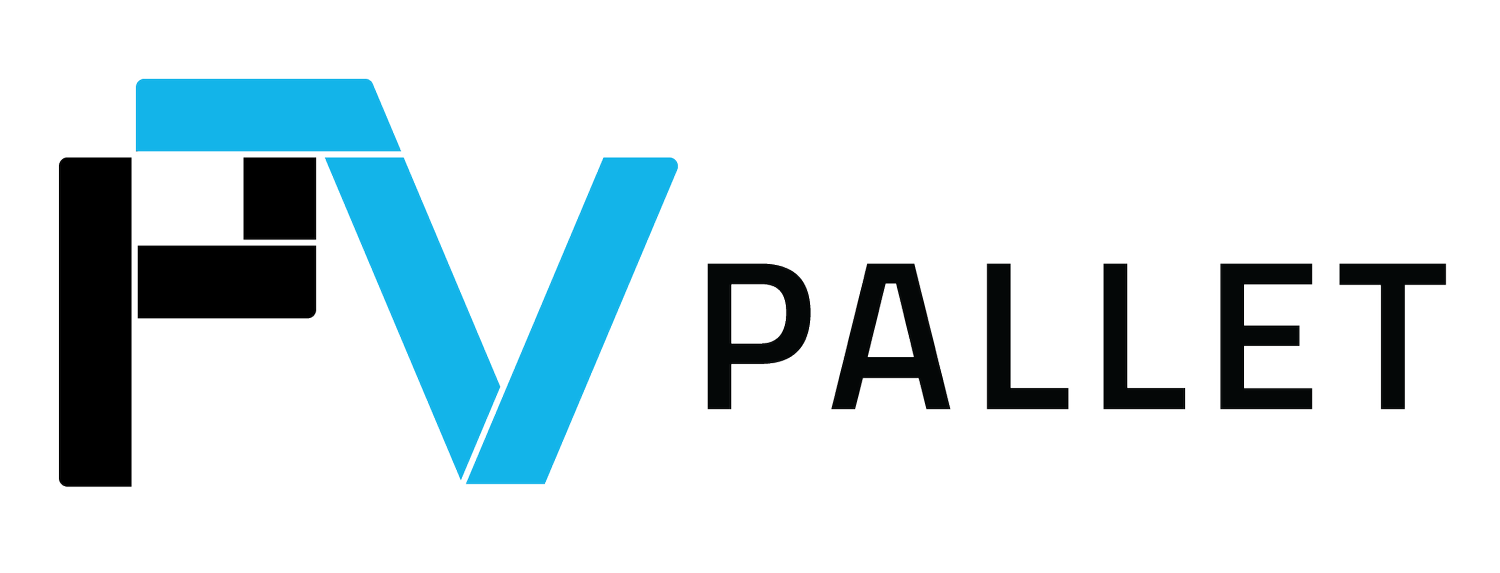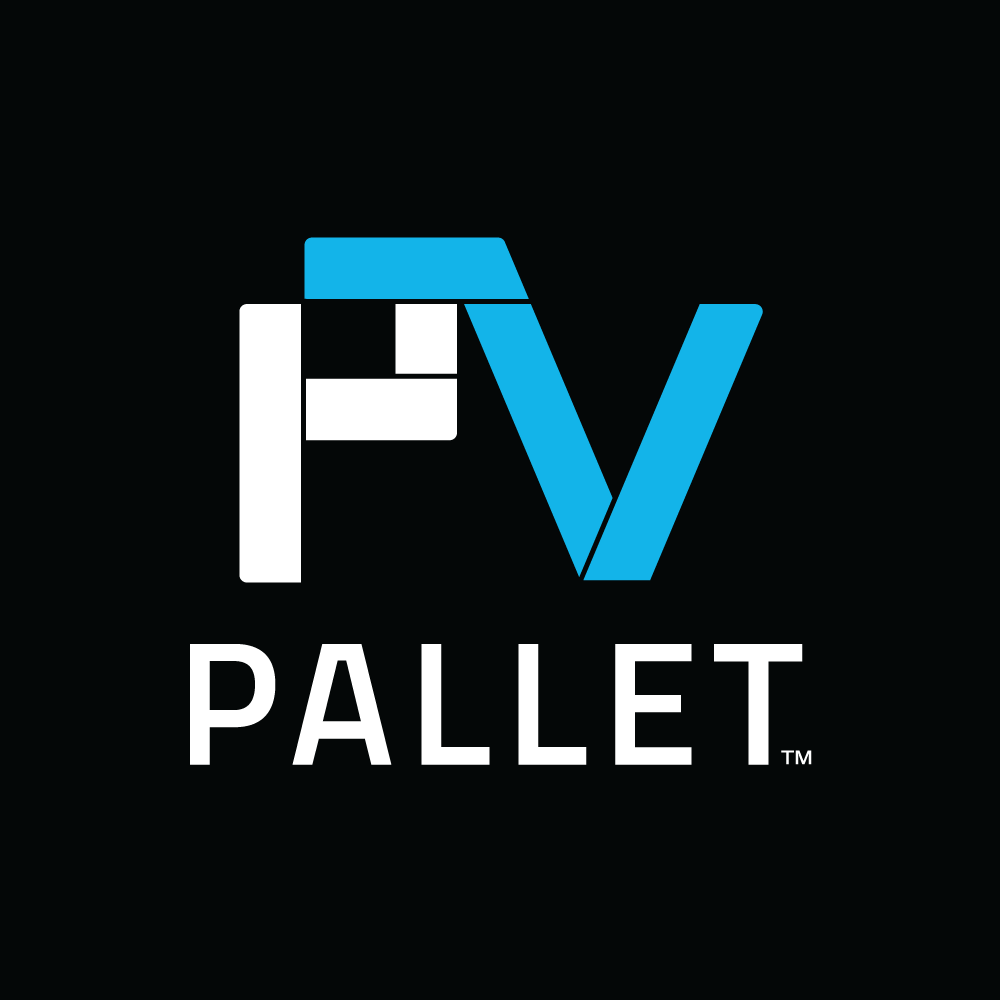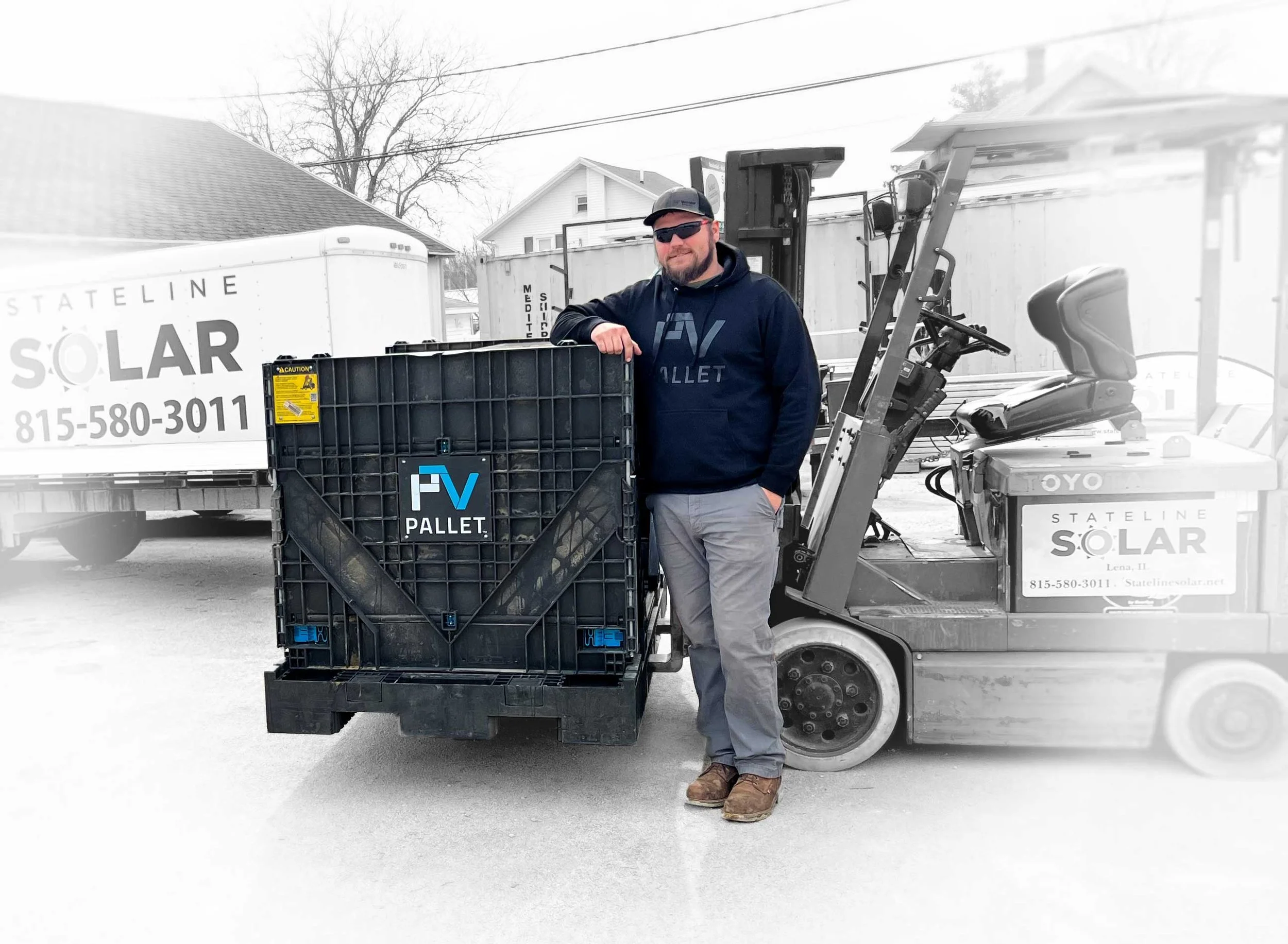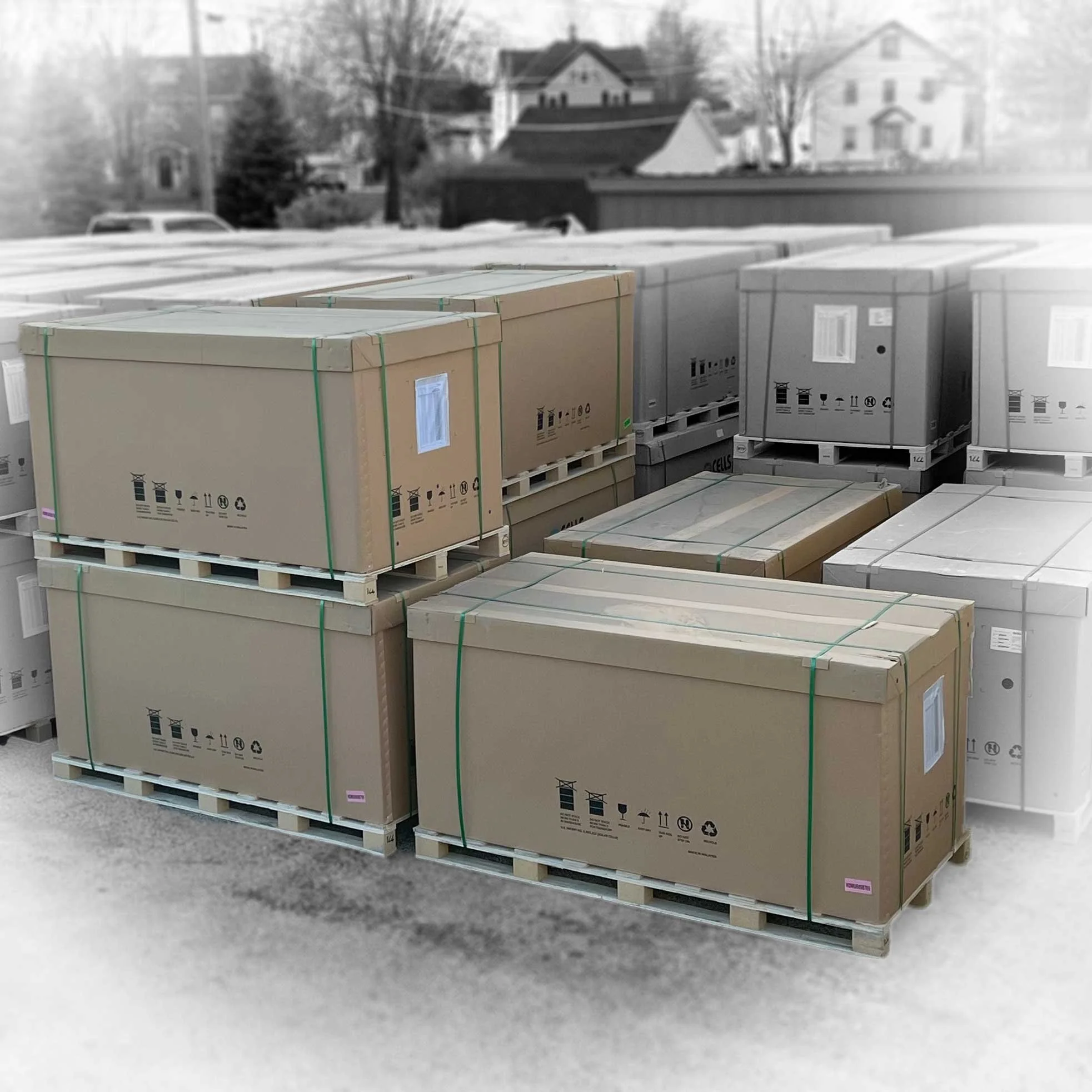Case Study: How Stateline Solar Transformed Their Solar Installation Preparation Process with PVpallet Series X
Business Challenges: Solar Panel Breakage, Packaging Waste, Labor Inefficiencies
Ethan Fiene, Founder and CEO of Stateline Solar, with one of their PVpallet Series X units
About Stateline Solar
Founded in 2017 by Ethan Fiene, Stateline Solar quickly became a trusted and reliable solar installation, maintenance, and repair company in the Illinois/Wisconsin state-line area serving over 400 satisfied solar customers. Stateline Solar takes pride in both their work and the environment. Rooted in Lena, Illinois, they strive to make solar power a common source of green energy for all Midwest homes.
Scenario
Boxes of solar panels in their original packaging
“Holy sh*t, why didn’t I think of that?”
The first moment Ethan Fiene, Founder and CEO of Stateline Solar, saw PVpallet Series X he knew it was the solution he needed. Stateline Solar’s job preparation process was frustratingly inefficient (and creating more breakage than Ethan cared to admit). In an initial attempt to reduce breakage, Stateline ordered solar panels in bulk directly from the manufacturer rather than partial loads from distributors. But that added protection came at a cost. Shipping panels to job sites in their original packaging meant panels could only be sent in quantities of 30, regardless of the number of solar panels needed. If a job required 36 panels, 60 were sent—leaving the remaining 24 to be repalletized and shipped back to the warehouse using ratchet straps and leftover packaging. No matter how carefully the solar panels were packaged, damage was common during the return trip.
When factoring in the price of the panel itself plus the cost to replace it (transportation, driver, labor, and recycling costs), each broken solar panel cost Stateline an estimated $800. With an average of two broken solar panels per month, Stateline Solar’s yearly losses reached $19,200. This inefficient system also required installation teams to spend valuable time packaging unused solar panels for the return trip and cleaning up trash from the panels’ original packaging. This process was taking an average of 1.2 hours per job, costing Stateline Solar an additional 624 manhours annually equating to $14,352 in added labor costs[1]. In all, Stateline’s current process was costing them over $30,000 per year.
Challenges
Breakage Rate: 24 solar panels per year
Returning partial loads of solar panels to Stateline Solar’s warehouse resulted in an average of two broken solar panels per month, or 24 broken solar panels each year.
True Cost to Stateline Solar: $19,200 per year
When factoring in the price of the module itself ($250) plus the cost to replace it (transportation, driver, labor, and recycling costs), each broken module was costing the company $800. At a true cost of $1,600 each month, Stateline Solar averaged $19,200 in breakage costs every year.
Labor Inefficiency: $14,352 per year
Packaging partial loads of solar panels and cleaning up packaging trash was time consuming, adding an average of 1.2 hour per job. At 10 installations per week, labor inefficiencies were costing Stateline 624 hours annually equating to $14,352 in labor costs each year.
Solution
Partial load of solar panels in PVpllet Series X
Stateline Solar needed an innovative solution that would simplify their job kitting process, reduce module breakage, and increase job site efficiency. To that end, they purchased four PVpallet Series X units in June 2022 and quickly integrated the product into their daily operations.
Two of their solar panel pallets are used daily for installations. Rather than sending full pallets of 30 solar panels to the job, Stateline loads their Series X with the exact panel count needed for each job site. The pallet’s load management system, combined with 2” ratchet straps, are used to secure the solar panels in transit. The remaining two PVpallet Series X units are used in the warehouse to organize and store surplus modules for future installations.
Over the course of the six-month case study, Stateline Solar used their two job site Series X units to transport solar panels to projects daily (totaling 150+ uses). Their warehouse units are used one to three times each week (cumulatively, they have been used 60+ times). This new process eliminates solar panel packaging waste on the job site and reduces the need to return extra panels to the warehouse.
Results
In the six-month duration of the case study, only one solar panel was reported as damaged. The robust sidewalls and base of PVpallet Series X allowed partial loads of vertically stacked solar panels to be unitized using the pallet’s load management system and 2” ratchet straps. Packaging waste and labor inefficiencies were significantly reduced.
92% breakage reduction
Over the six-month duration of the study, solar panel breakage rates were reduced by 92% from 12 to 1. As a result, Stateline Solar prevented $8,800 in product damage by using PVpallet Series X over a six-month period.
260 hours saved
Stateline reduced labor inefficiencies caused by solar module returns and trash pickup, saving an estimated one-hour per job. A total of 260 hours were saved over the six months of the study due to added efficiency—totaling $5,980 in reduced labor savings.
$29,560 annual savings
Stateline projects $29,560 in annual savings by implementing four PVpallet Series X units into their daily operations.
Outcome
“PVpallet Series X is a no-brainer solution,” explained Ethan. “Being in the renewable industry means having a green mindset: we all want to eliminate unnecessary waste and better the environment. When I saw PVpallet Series X, I instantly knew I needed to incorporate it into my daily operations to eliminate the constant pallet and packaging waste we see on the hundreds of job sites we install each year. The cost savings we experienced just further underscores the benefits of this innovative product.”
“PVpallet Series X has been a game changer—when preparing for each job site and to my installer crew,” says Zach Njos, Chief Operations Manager of Stateline Solar. “Using these reusable pallets has made organizing our solar panels a dream. They ensure we have exactly what we need for each project and keep our warehoused solar panels separated and safe.”
Integrating PVpallet’s robust, thoughtfully engineered solution into their operations allowed Stateline Solar to streamline its processes, prevent module breakage, and increase efficiency on the job site. After 150+ uses and $14,780 in savings within the first six months, PVpallet Series X has become an irreplaceable part of their operations. In all, Stateline Solar projects $29,560 in yearly savings by implementing only four PVpallet Series X units into their daily operations.
“When I saw PVpallet, I instantly knew I needed to incorporate it into my daily operations to eliminate the constant pallet and packaging waste we see on the hundreds of job sites we install each year. The cost savings we experienced just further underscores the benefits of this innovative product.”
Ethan Fiene, Founder and CEO of Stateline Solar
Future
The first time Ethan Fiene saw PVpallet Series X, he saw the product’s potential for his own operations. “We have utilized PVpallet Series X for over six months now and we’re amazed by the improvements it made to our productivity and waste elimination. Stateline Solar plans on further integrating PVpallet products into our daily operations,” explained Ethan.
Ethan also sees the product’s potential for the solar industry at large. In fact, he hopes to see worldwide adoption of PVpallet Series X to address the industry’s growing pallet and panel waste problem. Using cheap pallets to transport hundreds of billions of dollars’ worth of solar panels creates unnecessary waste both in damaged goods and solar businesses’ bottom line. In fact, an estimated 21,000,000 modules valued at $5.25 billion was lost due to solar panel breakage in 2021 alone .[2] Given that only 10% of solar PV modules are actually recycled, [3] full-scale adoption of PVpallet could prevent tens of millions of modules from winding up in landfills before they even enter service. By providing better productivity to solar companies like Stateline Solar and other installers, distributors, and manufacturers, greening up the Solar Industry will also help it take better care of its people.
Sometimes the obvious solution is also the right one. All you need is that “holy sh*t” moment.




